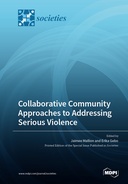Explore

Collaborative Community Approaches to Addressing Serious Violence
0 Ungluers have
Faved this Work
Login to Fave
The World Health Organization (2002) classified violence as a leading international public health problem that requires immediate intervention. Violence is a pervasive social problem whose causes and consequences are inextricably linked to individuals, families, institutions, communities, and societies. The negative consequences of violence, and serious violence in particular, reverberate beyond the immediate moment and location of it. By bringing together partners with varied skills, whole-system multiagency approaches are advocated as the leading means of targeting serious violence. With this context in mind, this Special Issue examines a variety of collaborative, community-based approaches to preventing and reducing serious violence across the global landscape. The contributions from practitioners and researchers focus on the prevention and reduction of serious interpersonal violence in communities. The typologies of serious violence discussed by the collaborators include gang membership, domestic violence, and sexual violence. The contributions address the collaborative nature of serious violence prevention work, recognizing that violence is multicausal and that solutions are needed across various socioecological domains. The contributions describe community-level collaborative approaches to preventing and reducing serious violence. The successes and lessons learned from the approaches are identified, and the applicability of the approaches to other areas are explored.
This book is included in DOAB.
Why read this book? Have your say.
You must be logged in to comment.
Rights Information
Are you the author or publisher of this work? If so, you can claim it as yours by registering as an Unglue.it rights holder.Downloads
This work has been downloaded 106 times via unglue.it ebook links.
- 106 - pdf (CC BY) at Unglue.it.
Keywords
- acceptability
- Access to Justice
- behavioural crime linkage
- BME
- child sexual violence
- co-design
- Collaboration
- collaborative
- collaborative crime prevention
- community-based advocacy
- Data Collection
- Domestic Abuse
- domestic and sexual violence
- Education
- epistemic justice
- feasibility
- gang migrants
- gender-based violence
- Good Lives Model
- help-seeking
- Homicide
- independent domestic violence advisors
- interagency collaboration
- Intervention
- Kenya
- Memory
- organizational logics
- particularly vulnerable areas
- Police
- policing gangs
- Prevention
- Psychology
- service improvement
- sexual violence
- Society & Social Sciences
- survey data
- Violence
- Yellow Door
Links
DOI: 10.3390/books978-3-0365-6222-3Editions

